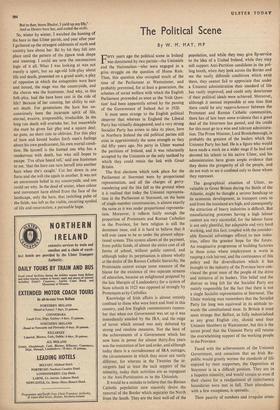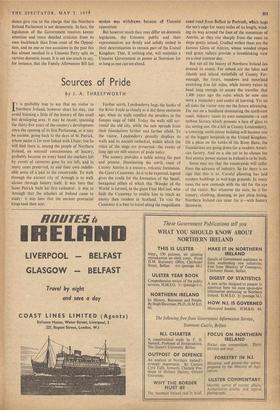The Political Scene
By W. M. MAY, M P FIFTY years ago the political scene in Ireland was dominated by two parties—the Unionists and the Nationalists—who were engaged in a grim struggle on the question of Home Rule. Then, this question also occupied much of the time of the Parliament at Westminster, and probably prevented, for at least a generation, the schemes of social welfare with which the English Parliament proceeded as soon as the 'Irish Ques- tion' had been apparently solved by the passing of the Government of Ireland Act in 1920.
It must seem• strange to the English political observer that whereas in England the Liberal Party has virtually disappeared, and a very strong Socialist Party has arisen to take its place, here in Northern Ireland the old political parties still exist in approximately the same strength as they did fifty years ago. No party in Ulster wanted the partition of Ireland, and it was reluctantly accepted by the Unionists as the only method by which they could retain the link with Great Britain.
The first elections which took place for the Parliament at Stormont were by proportional representation, and all the charges of gerry- mandering and the like fall to the ground when it is realised that today the Unionist representa- tion in the Parliament at Stormont, on the basis of single-member constituencies, is almost exactly the same as it was under proportional representa- tion. Moreover, it reflects fairly enough the proportion of Protestants and Roman Catholics in the Province, for here religion is still the dominant issue, and it is hard to believe that it will ever cease to be so under the present educa- tional system. This system allows of the payment, from public funds, of almost the entire cost of all forms of school, without public control, and although today its perpetuation is almost wholly at the desire of the Roman Catholic hierarchy, the Protestants cannot escape some measure of the blame for the existence of two separate streams of education, because an enlightened proposal by the late Marquis of Londonderry for a system of State schools in 1923 was opposed as strongly by Protestants as by Catholics.
Knowledge of Irish affairs is almost entirely confined to those who were born and bred in this country, and few English commentators remem- ber that when our Government was set up it was immediately assailed by the IRA, and the reign of terror which ensued was only defeated by strong and resolute measures. Not the least of the achievements of a Government which has now been in power for almost thirty-five years was the restoration of law and order, and although today there is a recrudescence of IRA outrages, the circumstances in which they occur are vastly different, for whereas in the Twenties the in- surgents had at least the tacit support of the minority, today their activities are as repugnant to the Anti-Partitionists as to the Unionists. It would be a mistake to believe that the Roman Catholic population now sincerely desire the removal of the Border which separates the North from the South. They are the least well-off of the population, and while they may give lip-service to the idea of a United Ireland, while they may still support Anti-Partition candidates in the pol- ling booth, when they look across the Border and see the vastly different conditions which exist there, they cannot fail to appreciate that under a Unionist administration their standard of life has vastly improved, and could only deteriorate • if their political ideals were achieved. Moreover, although it seemed impossible at one time that there could be any rapprochement between the Protestant and Roman Catholic communities, there has of late been some evidence that a great deal of the bitterness has passed, and the credit for this must go to a wise and tolerant administra- tion. The Prime Minister, Lord Brookeborough, is probably the greatest of the leaders which the Unionist Party has had. He is a figure who would have made a mark on a wider stage if he had not devoted his talents to his native Ulster, and his administration have given ample evidence that they desire the prosperity of all the people, and do not wish to see it confined only to those whom they represent.
The geographical situation of Ulster, so valuable to Great Britain during the Battle of the Atlantic, might be thought a serious handicap to its economic development, as transport costs to and from the mainland are high, and consequently the attraction of heavy industries is difficult. But manufacturing processes having a high labour content are very successful, for the labour force is not only plentiful, but adaptable and very hard • working, and this fact, coupled with the consider- able financial advantages offered to new indus- tries, offers the greatest hope for the futtire. An imaginative programme of building factories in those areas where employment is worst is reaping a rich harvest, and the continuance of this policy and the diversification which it has brought to the industry of the Province have con- vinced the great mass of the people of the drive and initiative of its leaders. This belief and the distrust so long felt for the Socialist Party are mainly responsible for the fact that there is not a single Socialist representative at Stormont. The Ulster working man remembers that the Socialist Party for long was equivocal in its attitude to- wards the constitutional issue. In Britain it must seem strange that Belfast, as fully industrialised as any great English city, should send four Unionist Members to Westminster, but this is the surest proof that the Unionist Party still retains the overwhelming support of the working people in the Province.
Faced with the achievements of the Unionist Government, and conscious that an Irish Re- public would greatly worsen the standards of life enjoyed by their supporters, the Opposition at Stormont is in a difficult position. They are in a hOpeless minority, and would remain so even if their claims for a readjustment of constituency boundaries were met in full. Their attendance, with a few exceptions, is sporadic.
Their paucity of numbers and irregular atten- dance give rise to the charge that the Northern Ireland Parliament is not democratic. In fact, the legislation of the Government receives keener attention and more detailed criticism from its own backbench than from most of the Opposi- tion, and on one or two occasions in the past this has almost resulted in a Unionist Party split on various domestic issues. It is not too much to say, for instance, that the Family Allowances Bill last session was withdrawn because of Unionist opposition.
But however much they may differ on domestic legislation, the Unionist public and their representatives are firmly and solidly united in their determination to remain part of the United Kingdom. That, if nothing else, will maintain a Unionist Government in power at Stormont for as long as one can see ahead.











































 Previous page
Previous page